Place Names of Singleton and Surrounding district
Compiled by TerryCallaghan
Likes![]() ()Dislikes
()Dislikes![]() (0
(0
Work in Progress
Introduction
Toponymy is the study of place names and is derived from Greek words topos (place) and omoma (name). Place names are used to indicate, denote, or identify a geographic location such as a town , river or mountain that has some kind of significance or to distinguish it from other places. As such there are two broad categories: habitation names and feature names. Habitation names are for example, towns, village or property. Feature names refers to the landscape and can be divided further into hydronyms ( water features), oronyms ( relief features)’ and paves of natural vegetation ( meadows, glades, groves).Many names fall into the specific- generic mould. For example Jerrys (specific) and Plains (generic). This name can also be classified as a possessive name derived from the idea of ownership. Also Campbell’s Creek, McIntyre River etc.
This listing of the names of places and property of Singleton and the local district has been compiled from a number of sources. In some cases these have been primary material such as newspapers of the period whilst in others from previous studies and various historical works. Where this has been the case the reference is noted to the original work acknowledged. Where names have mention in the original reference they are also noted.
Abbreviations
MM MaitlandMercury
HRG Hunter River gazette
SA Singleton Argus
JRAHS Journal of the Royal Australian Historical Society
* associated names
Abbey Green property of Archibald Mosman, a Sydney merchant, purchased from Alexander Warren who received 4000 acres 16 May 1825; located south of Singleton.[1]
Aberdour a farm adjoining the township of Wollombi; advertised to let by Major Sullivan in 1852.[2]
AlbionPark property near Paterson; * FrancisHegan[3]
Annandale property owned by David Maziere, later changed to Dalwood (q.v.) or Wyndham Estate.[4]
Anvil Creek crosses the New England Highway on the Maitland side of Branxton; possibly named so named after the blacksmith forge; also location for Anvil Colliery. Sometimes Anville Creek (see hrg 19 Feb 1842)
Archdale property at Goorangoola, named by Heinrich Archindal c.1864.[5]
Archerfield named by GeorgeBowman family, 1825 – hence ‘Archer…’ located at junction of HunterRiver and Falbrook creek
Arrowfield a holding in the Denman district; named by George Bowman in 1824. Hence ‘Arrow…’
Ardersier. named by Alexander Munroe after his birth place in Scotland. Note that since 1623 it has had the alternate name of Campbelltown.[6]
Ashton 80 acres at Camberwell. JohnDrake in 1885
Belford also known as Jump Up Creek; early landholder ArchibaldBell – so possibly ‘Belford’- 95 acres held by WilliamDryes snr
Bell Isle named by James McManus after his hometown in Ireland. [7]
Belmont In 1825 a grant of 1000 acres on Black Creek held and named by Thomas Coulson jnr.[8] C. 1830.Owned by Dr. John William Penn Blick in 1840 [9] Later the Belbourie vineyard property.
Bickham property on the Pages River [10]
Big River
Birnam Wood Holding at Warkworth held by Edward Alford in 1885.[11]
Black Creek. A tributary of the Hunter, which rises in the Broken Back range and joins the Hunter near Branxton.
Blandford after early settler
Bona Vista A property on the Paterson River south of Paterson township which in 1828 was owned by James Phillips. [12]. It was advertised for sale in 1854 as being 2000 acres ‘bounded by the Government High road and Paterson river and Tocal and Webber’s creeks – located between Paterson and Tocal.[13]
Branxton named after a town in Northumberland.
Bridgman originally a grant to Thomas Clayton; later owned by Captain Robert Lethbridge and named by him after his home in County Clare, Ireland; managed by Richard Alcorn.[14]
Brinkburne a property on the Upper Paterson river near Gresford; * G.T. Fenwick [15]
Broke named by Major ThomasMitchell after Sir Charles Broke Vere.
BrookLodge, Wollombi
Boggy Flats also as Boggy Boggy Flat. In 1885 known as Macsfield possibly after landowner William McDonald. [16]
Bulga. An aboriginal word meaning ‘single mountain’. [17]
Camberwell Lower Falbrook, named by Henry Dangar. [18]
Campbell’s creek. Tributary of Goorangoola or Dry creek.
Carrow brook. A stream named by the Aborigines.[19] Its meaning is not known; [20] j joins Main creek and then known as Falbrook or Glennies creek
Castle Forbes. Original grant to James Mudie on the 2 Aug 1822 and named by him.[21]
Cheshunt a stock station occupied by William Simms Bell in 1821[22]; later purchased by Captain Russell, Warkworth (1)
Chilcott’s Plains named after James Chilcott of ‘The Goodland’s’ (q.v.) who ran sheep and cattle on it. Chilcott creek crosses the New England Highway near the Liddell and Bayswater Power stations.
Clifford property owned by Samuel Billingsly Dight [23]
Clydesale owned by John Johnston [24]
Clairfield located at Middle Falbrook;
Clevedon property on the Allyn River, in 1851 owned by James McCormick [25]
Cockfighter Creek. said to be named by John Howe in 1820 after a horse of the same name was bogged in the crossing.[26] Wollombi brook (near Warkworth)
Combo(e) or Coombo. said to be named after an aboriginal who lived in the area.[27]
Corinda. holding at Belford; grant to Archibald Bell; aboriginal word meaning ‘happy place’; advertised in 1850 as being 1300 acres for sale … situated about 5 miles from Black Creek and 19 miles from Maitland.[28]
Cross creek. a tributary of Campbell’s creek q.v.
Dalkelth property near Cassillis [29]
Dalwood. a crown grant on the south west bank of the Hunter near Branxton obtained by George Wyndham in 1828 and named by him. [30] Purchased Annandale (q.v.) from DavidMaziere.
Dalziel
Darlington. 2000 acres near Singleton to George Galway Mills, an officer emigrant, on the 15 Oct. 1824. [31]Mills died 20 Feb 1828.
Dartbrook. discovered and named by Henry Dangar in 1824 [32] ; possibly after the River Dart, Devonshire. Rises in the Liverpool ranges near Mt.Towaru and joins the Hunter near St Heliers (q.v.)
De Quirosville. Dr.Thomas Parmeter settled on the Cockfighter creek in 1826 naming his property after the Spanish explorer Captain De Quiro who Parameter claimed discovered Australia.[33]
Drayton. early name for New Freugh. q.v.
Dry Creek. also known as Goorangoola (Goorangoola station established 1838 by ??)
Dulwich located east of Camberwell; named after James Glennie’s hometown in Surrey.[34] The original meaning of the word is ‘marshy meadow where dill grows’ (c)
Dunolly named by James McDougall after ‘Dunolly Castle an ancient stronghold of the clan McDougall. [35]
Dunvegan homestead on the Upper Paterson of three hundred and eighty five acres * Fenwick, Dr. Lang, J. Browne [36]
Elderslie a village in Renfrewshire, Scotland.[37]
Elmhurst property near Paterson which in 1854 was owned by W.W.Bucknell[38]
Falbrook place name from Devon, Cornwall; now known as Glennie’s Creek; sometimes Fallbrook; tributary of Goorangoola / Dry creek qv.
Farnborough town on the Government road Maitland to Singleton [39]
Fern Donald possibly after the owner DonaldMcDonald
Flowerbank
Fordwitch
Gammon Plains * JohnPerfrement[40]
Glennie’s Creek after Mr.JamesGlenie, J.P., an early settler and owner of Dulwich Estate. (q.v.); originally known as Lower Falbrook.
Glendon grants of 2060 acres to Robert Scott. J.P. 24 April 1822 and also to Helenus Scott a adjoining grant of 2090 acres on the same date; located on the Hunter river east of Singleton.[41]
GlenAlbion on the Paterson river, * JamesMcEwen[42]
Glen Rose property of 2000 acres on the Paterson River owned by A.E. Biddulph RN in 1842. [43]
Glenarm on the WilliamRiver[44]
Glendon Brook
Glencoe near Murrurundi; * DavidWatt / A.S.F. McIntosh [45]
Glendon Cottage
Glendon Flat
Glenridding
Goorangoola named by Robert Dawson agent for the AA Company.[46] Whilst ‘goora’ is a component of many place names – the essential meaning of the word is ‘long’ or ‘tall’: ‘goola’ means kangaroo so possibly ‘big kangaroo’ [47]; * Richard Carter [48]
Great Lodge. Proerty in the Jerry’s Plains district owned by Richard Hobden in 1867.
Greenwood named by assistant surveyor, George Boyle White and his home in 1831;[49] advertised to let by Mrs. White in 1849.[50]
Gunnibgindi a station on the Mooney River.[51]
GwydirR.
Hampton Park near Jerry’s Plains, residence of Peter Duff [52]
Harrowfield property near Jerry’s Plains; * Thomas Ellis, R.T.Capp.[53]
Haydonton a private village owned by Thomas Haydon and located on the Page River near Murrurundi.[54]
Jerry’s Plain named after an Irish convict[55]. The obituary of Richard Alcorn mentions Jerry’s Plains as taking its name from a servant ‘Jeremiah, losing his thumb through the bursting of a pistol…mortification setting in he died and was buried in the paddock opposite the post office here’.[56]
Johnson’s Stockyard Station
Jump Up Creek The New England Highway crosses the creek east of Singleton; early name for Belford.
Kelso Place. place in County Roxburgh, Scotland and former home of Lady Brisbane wife of Governor Brisbane (1821-25). Area to the south of Singleton
Kayuga named by Donald McIntyre after Lake Cayuga in New York State c. 1827 [57]. Spelt in America as ‘cayuga’ to commemorate the Cayuga tribe of the Iroquois nation. McIntyre had lived in North America before settling in NSW. Located near the junction of Dartbrook and the HunterRiver.
Kirkton means ‘village with a church’[58]. John Busby in May 1824 acquired 2,000 acre on the Hunter River, which he named Kirkton after his birthplace.[59]
Knockfirm estate of 2000 acres adjoining Luskintyre; * V.Jacob [60]
Lennoxton Paterson river, * John Lodge [61]
Lewinsbrook a property on the Patterson River near Gresford planted as a vineyard by Dr. Alexander Park c.1830 [62]
Lochinvar named by Leslie Duguid who received 2,000 acres . [63]
Liddell a town in Scotland
Liverpool Plains
Lochnager
Long Pt.
Luskintyre grant of 2000 acres to Alexander McLeod.[64]
Maison Dieu French phrase meaning ‘house of God’ or ‘God’s house’.
Maryville property near Jerry’s Plains held by John Alford in 1867.[65]
Merton property of about 6000 acres in the Upper Hunter near the junction of the Hunter and Goulburn rivers. [66] Granted to Captain William Ogilvie in 1825 and named after his home in Surrey. ‘Merton’ being once the home of Nelson.[67]
McDonalds Flat a locality in the valley of the Wollombi.[68]
McIntyre River. named by Alan Cunningham after his friend Peter McIntyre of Segenhoe.
Minimbah. An Aboriginal word from minim or minimbu teacher ( of tribe) or elder and bah meaning place. [69]
Mitchell’s Flat
Monkey Place. property owned by Henry Hewett; [70] said to be named by early settlers who mistook Koala bears for monkeys.
Mount Loder after George Loder early settler
Mount Pleasant Upper Falbrook
Mount Thorley after Thorley, early setler
Mucki
Namoi River Abor. word; from ngnamai or nygamai, a species of acacia.[71] ; previously called Muelneriindi by the natives.[72]
Neotsfield. 700 acres from Macquarie, 1821 and further 300 acres from Brisbane 1825; [73] Named by Dangar after the Dangar Farm at St.Neot in Cornwall
Newington farm at Whittingham named by John Rotton c. 1822 after their home Newington Green, London [74]
New Freugh a property approximately 3 km east of Singleton on the Hunter River. The original landholder was John Malcolm who received a grant of 2050 acres on the 15 April 1823. Property sold by John Stephen Ferriter RN in 1844 to J.S.C.McDouall who changed the name from Drayton to New Freugh after his clan home Freugh Scotland.
Oak Park farm owned by Edward Drake [76]
Oak Park property near Jerry’s Plains. * Huxley
Oalleigh residence of Richard Alcorn at Jerry’s Plains [77]
Oakville farm on the Broke road near Warkworth
Oswald a ‘ticket of occupation’ grant of 2000 acres in 1823 to Scottish surveyor William Harper. Located on the Hunter river near Greta and named by Harper after Sir John Oswald.[78]
Payne’s Crossing also known as Stockyard Creek
PAYNE’S
Pighole
Patrick’s Plains
Pullumimbra area of land offered for sale at Jerry’s Plains 1842 * RichardAlcorn[79]
Radfordslee property at Black Creek; * T.B. Cox [80]
Ravensworth named by Dr.James Bowman; located on Foybrook creek.
Redbournberry named by John Howe after his native town in Lincolnshire c. 1822.[81]
Redhouse, Wollombi Br.
Red House also known as the Red Inn, Black Creek; opened by Thomas Coulson c. 1831.[82]
Red House also another ‘Red House’ on Wollombi Road.[83]
Rix’s Creek tributary of the …..; also possibly known as Rick’s Creek.[84]
Rosemount: John Larnach the son-in-law of James Mudie of ‘Castle Forbes’ built ‘Rosemount’ now known as ‘Baroona’; advert ‘to let’ 1200 acres located 6 miles from Singleton.[85]
Rothbury a town in Northumberland; ‘roth’ possibly ‘red’ [86]
Sherwood property about 920 acres on the Allyn river near the residence of Charles Boydell. [87]; also property of the same name on the Wattle Ponds, seven miles from Singleton and the estate of H.Dangar.[88]
Springwod
Strowan property at Jerry’s Plains; * JohnRobertson[89]
St Clair 3,609 acres purchased and named by Loder of ‘Abbey Green’ [90]
St. Helier’s named after the seaport in Jersey, St. Helier by Colonel Henry Dumaresq.[91]
Stamford
Stanhope. From a town in County Durham means ‘stony place’ [92]
Sydenham named by John Brabyn 1824; 800 acres on the ‘west side of the Falbrook’ [93]
Tableland Sheep Station
Tangorin located 14 miles from Maitland on Black creek and the Hunter river near Branxton. A Taylor gives it as his residence in 1852 whilst in 1854 it was owned by a W.F.Gordon.[94]
Tea Tree Station located at the head of Glendon Brook, of 1280 acres; also possibly known as ‘Miranie’.[95]
The Goodlands a farm first owned by Henry Snell and later by James Chilcott. c.1826. [96] Located near Middle Falbrook bridge.
Torwood property on the Williams river; * A.N. Crump [97]
Twickenham Meadows. the country near the junction of the Goulburn and Hunter rivers—Denman district.[98]
Vineyard Cottage a property of Captain George Jackson Frankland on the Paterson River.[99] 2080 acres grant 25 Aug 1823. Frankland died 1 Dec 1825.[100]
Wallah on the NamoiRiver near Narrabri; original grant to Bartlett
Whittingham. named by Dangar in 1871 after place of same name in Haddingtonshire. [101]
Wollombi. Aboriginal word meaning, ‘meeting of the waters’.
Wollun a property of 5000 acres on the Hunter River between Jerry’s Plains and Merton; advertised ‘to let’ by Mrs. G. Blaxland [102]
Woodville
Wrix’s Creek
Wylie Flat. grant to Colonel Mills in 1820 ; later sold to Captain Loder: Singleton 100 acres St. T. Loder (1)
Yellow Rock 2500 acres Broke, JamesEdwards (1)
Bibliography
Articles
Campbell, J.F. The Genesis of Rural Settlement on the Hunter, Journal of the Royal Australian Historical Society (RAHS), Vol. XIII, Part II, 1926.
Dangar, ElisabethMary. ‘WilliamDangar of Turanville’, Scone & Upper Hunter Historical Society 1968.
Green, H.J.C., The Pioneer Settlement of the HunterValley. 1821 – 1831. M.A. Thesis, University of Newcastle. 1975.
Irish, C.A., Names of Railway Stations in New South Wales. With their Meaning and Origin. Royal Australian Historical Society. Vol. 13, Part 2, 1927.
Jervis, J., The HunterValley. A Century of Its History. Royal Australian Historical Journal, Vol.XXXIX, 1953, Part 3.
Books
Cameron, K., English Place Names. Redwood Books. London. 1996.
Cloos, P., Tampke,J., (eds.) Greetings From the land where milk and honey flows. The German Emigration to Australia 1838 – 1858. Canberra. 1993.
Flanagan, D., and Flanagan L., Irish Place Names. Gill & Macmillan. Dublin. 1994.
Gray, Nancy. ThomasCook of Turanville, Scone & Upper Hunter Historical Society, 1977.
Guilford, E., Journal of HunterValley History. Newcastle. 1988
Mackay, G., Scottish Place Names. New Larnack. 2000.
Martin, A.E., One Thousand Place Names in New South Wales. NSW Bookstall Co., Sydney. 1943.
McGee, John. Two And A Half Convicts. Singleton Historical Society. Singleton 1987.
Mills, A.D., Oxford Dictionary of English Place Names. 2nd. Ed.OxfordUniversity Press. Oxford.1998
Noble, L.M., The Glennies Creek Story, nd.
O’Connell, J., The Meaning of Irish Place Names. Blackstaff Press. Belfast. 1995.
Parkes, W.S., Comerford, J., Lake, M. Mines, Wines and People. A History of Greater Cessnock. Sydney. 2000
Reed, A.W., Aboriginal Place Names. Reed. Artarmon.1874.
Room, A., Guide to English Place Names. Longman. Harlow. 1985.
Turner, J. Who Was Who in the Hunter
Woods, A.W., Dawn in the Valley. Sydney. 1972.
A History of the Combo area of Singleton as told by an old resident Mr.AlecCallen May 1983. Sighted Newcastle Regional Library. Call No: 994.42/SIN
Symes, J.G., ‘PeterMcIntyre’ in The Tide of Times, Inverell and District Historical Society, No. 3. February 1969
Journal of the Legislative Council of NSW. Census of Landholders 1885.
Family History Society Singleton Inc. (ed.), Singleton District Pioneer Register, Singleton, 1989. p.57.
[1] Green, H.J.C., The Pioneer Settlement of the HunterValley. 1821 – 1831. M.A. Thesis, University of Newcastle. 1975. p.197.
Campbell, J.F. The Genesis of Rural Settlement on the Hunter, JRAHS Vol. XIII, Part II, 1926. p.87
[2]MaitlandMercury, 15 December 1852.
[3] MM, 6 October 1855
[4] Green, op.cit.. p.197.
[5] Cloos, P., Tampke, J., (eds.), Greetings From The Land Where Milk and Honey Flows. The German Emigration to NSW 1838 – 1858. Canberra. 1993. p.31.
[6] Mackay, G., Scottish Place Names. New Larnack. 2000. p. 8.
[7] Noble, L.M., The Glennies Creek Story, nd. p.23
[8]Guilford, E. Journal of HunterValley History. Newcastle. 1988. p.134
[9] Parkes, W.S., Comerford, J., Lake, M. Mines, Wines and People. A History of Greater Cessnock. Sydney. 2000 p.117.
Maitland Mercury,7 July 1849.
[10] MM, 7 July 1844
[11] 1885 Census of Landholders.
[12] Green, op.cit. p.199.
[13]MaitlandMercury, 2 December 1854 and 30 June 1855.
[14] Woods, A.W., Dawn in the Valley, Sydney, 1972. p. 129.
[15]MaitlandMercury, 28 Jan 1843, 3 July 1852.
[16] Turner, J. Who was Who in Hunter … p.99
[17] Reed, A.W., Aboriginal Place Names.
[18] Noble, L.M., The Glennies Creek Story, nd. p.36.
[19] Jervis, J., ‘The HunterValley. A Century of Its History, RAHS, Vol. XXXIV, Part III, 1953 p .108
[20] Jervis, J., The HunterValley. A Century of Its History, Royal Australian Historical Journal, Vol.XXXIX, 1953, Part 3.
[21]Campbell, J.F. The Genesis of Rural Settlement on the Hunter, JRAHS Vol. XIII, Part II, 1926. p.84
[22] Woods, A.W., Dawn in the Valley, Sydney, 1972. p. 35
[23] MM. 6 August 1864
[24]HunterRiver Gazette, 19 March 1842
[25] Maitland Mercury, 17 September 1851.
[26] Woods, A.W., Dawn in the Valley, Sydney, 1972. p. 13.
[27] A History of the Combo area of Singleton as told by an old resident Mr.AlecCallen May 1983. Sighted Newcastle Regional Libary Call No: 994.42/SIN
[28]MaitlandMercury, 27 Feb 1850.
[29] MM, 2 June 1847
[30] [30] Parkes, W.S., Comerford, J., Lake, M. Mines, Wines and People. A History of Greater Cessnock. Sydney. 2000 p.231
[31]Campbell, J.F., The Genesis of Rural Settlement on the Hunter. Journal of the Royal Australian Historical Society, Vol. XII, Part II. 1926.
[32] Gray, Nancy. ThomasCook of Turanville, Scone & Upper Hunter Historical Scociety, 1977. page11.
[33]McGee, John. Two And A Half Convicts. Singleton Historical Society. Singleton 1987.p.14
[34] Noble, L.M., The Glennies Creek Story, nd. p.7
[35] Woods, A.W., Dawn in the Valley, Sydney, 1972. p. 279.
[36] HRG 11 June 1842
[37] Mackay, G., Scottish Place Names. New Larnack. 2000. p. 33.
[38]MaitlandMercury, 2 December 1854
[39] HRG, 11 June 1842 , p. 2
[40] MM, 1 July 1848
[41]Campbell, J.F., The Genesis of Rural Settlement on the Hunter. Journal of the Royal Australian Historical Society, Vol. XII, Part II. 1926.
[42] MM, 5 August 1854
[43] HRG, 2 April 1842
[44] MM, 4 December 1850
[45] MM, 29 March 1851
[46] Noble, L.M., The Glennies Creek Story, nd. p.7
[47] Reed, A.W. Aboriginal Place Names and their meaning. Reed. Sydney . 1974. p.43.
[48] MM, 6 August 1864
[49] Woods, A.W., Dawn in the Valley, Sydney, 1972. p. 223
[50]MaitlandMercury, 7 July 1849.
[51]MaitlandMercury, 3 July 1852.
[52] MM, 4 December 1850
[53] HRG, 26 March 1842, p.2.
[54]MaitlandMercury, 2 December 1854
[55] Jervis, J., ‘The HunterValley. A Century of Its History, RAHS, Vol. XXXIV, Part III, 1953.
[56] Singleton Argus, 15 Jan 1879.
[57] Symes, J.G., ‘PeterMcIntyre’ in The Tide of Times, Inverell and District Historical Society, No. 3. February 1969
[58] Oxford Dictionary of English Place Names
[59] Parkes, W.S., Comerford, J., Lake, M. Mines, Wines and People. A History of Greater Cessnock. Sydney. 2000 p.224.
[60] MM 15 September 1855, p.4
[61] MM, 6 October 1852
[62] [62] Parkes, W.S., Comerford, J., Lake, M. Mines, Wines and People. A History of Greater Cessnock. Sydney. 2000 p.229
[63] Woods, W.A.Dawn in the Valley, Sydney, 1972. p. 27
[64] Woods, op cit. p. 39
[65] Journal of the Legislative Council of NSW. Census of Landholders 1885.
[66] Jervis, J., ‘The HunterValley. A Century of Its History, RAHS, Vol.XXXIV, Part III, 1953 p.103.
[67] Cloos, P., Tampke, J., (eds.), Greetings From The Land Where Milk and Honey Flows. The German Emigration to NSW 1838 – 1858. Canberra. 1993. p.94
[68]MaitlandMercury, 3 July 1852.
[69]Martin, A.E., One Thousand Place Names in New South Wales. NSW Bookstall Co., Sydney. 1943.
[70] Green, op.cit..
[71] Reed, A.W., Aboriginal Place Names.
Woods, A.W., Dawn in the Valley, Sydney, 1972. p. 223
[73]Campbell, J.F. The Genesis of Rural Settlement on the Hunter, JRAHS Vol. XIII, Part II, 1926. p.81.
[74]McGee, John. Two and a Half Convicts. Singleton Historical Society, 1987. p. 19
[75] Dangar, ElisabethMary. WilliamDangar of Turanville, Scone & Upper Hunter Historical Society 1968, p.35.
Family History Society Singleton Inc. (ed.), Singleton District Pioneer Register, Singleton, 1989. p.57.
[76] Noble, L.M., The Glennie’s Creek Story, nd. p.18
[77] Singleton Argus, 15 January 1879
[78] Parkes, W.S., Comerford, J., Lake, M. Mines, Wines and People. A History of Greater Cessnock. Sydney. 2000 p.110-111.
[79] HRG, 19 March 1842
[80] MM, 11 Jan 1854
[81] Woods, op. cit. p. 14
[82]Guilford, op.cit. p. 136.
[83]MaitlandMercury, 2 July 1853.
[84]MaitlandMercury, 15 December 1852.
[85] MM, 14 April 1849.
[86] Mills, A.D., Oxford Dictionary of English Place Names. 2nd. Ed. Oxford Universirt Press. Oxford.1998
[87] Maitland Mercury.2 December 1854.
[88] Wells, Geographical Dictionary of the Australian Colonies. First published 1848. Facsimile edition 19..
[89] MM, 7 December 1844
[90] Noble, op cit. p.73
[91] Woods, op .cit. p. 169.
[92] Oxford Dictionary of English Place Names
[93] Noble, L.M., Op. cit., nd. p. 8.
[94]MaitlandMercury, 4 March 1853, 3 July 1852, 2 December 1854
[95]MaitlandMercury17 March 1857.
[96] Noble, L.M., Op. cit., nd. p.18-19.
[97] MM, 11 Jan. 1854
[98] Jervis, J., ‘The HunterValley. A Century of Its History, RAHS, Vol. XXXIV, Part III, 1953. p.103.
[99] Woods, op. cit. p. 39-40
[100]Campbell, J.F. The Genesis of Rural Settlement on the Hunter, JRAHS Vol. XIII, Part II, 1926. p.82.
[101] Irish, C.A., Names of Railway Stations in NSW. RAHS. Vol. 13, Part 2. 1927. p.141.
[102] MM, March 20, 1852

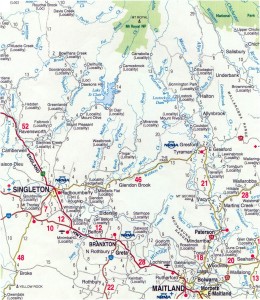
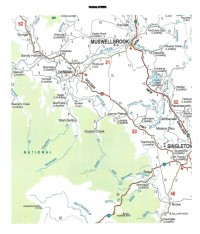
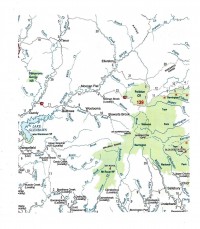
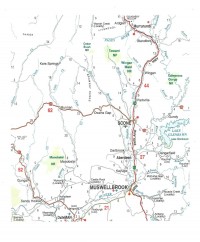
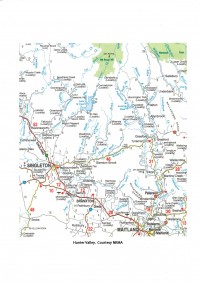
Hello Terry
I am researching the Cunneen family and I have discovered that John Cunneen aquired a property called ‘Clairfield’ or ‘Clarefield’ in 1837 at Middle Falbrook, then another later, Ventura. His son Michael 1810-1876 married Hannah Chilcott 1818-1880 whose father gave her 240 acres which at her death was bought by Jacob Asimus.
Their daughter Isabella Cunneen 1841-1898 married Edward Solomans.
Can you help me with the locations of these properties please.
Kind regards
Derek